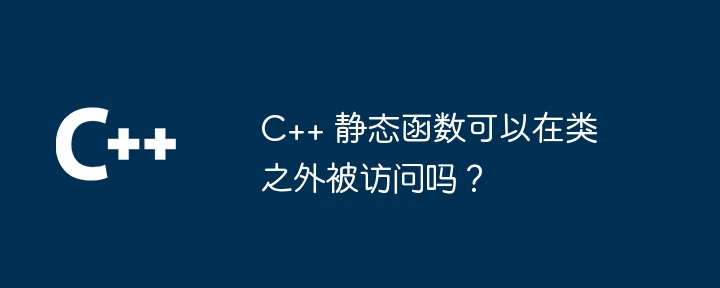Home >Backend Development >C++ >Can C++ static functions be accessed outside the class?
Can C++ static functions be accessed outside the class?
- WBOYWBOYWBOYWBOYWBOYWBOYWBOYWBOYWBOYWBOYWBOYWBOYWBOriginal
- 2024-04-16 12:06:02717browse
Yes, static functions can be accessed outside the class. They are not related to a specific object and the syntax is: static return_type function_name(parameters);. It can be accessed like a normal function using MyClass::function_name(...) via the range resolution operator. Static functions are often used in utility programs or auxiliary functions and cannot access non-static member variables or functions.

#C Can static functions be accessed outside the class?
In C, static functions are class member functions that are not associated with a specific object. This means they can be called outside the class without first creating an instance of the class. This is useful for utility functions or helper functions, which can be used by different parts of the application.
Syntax
The syntax for declaring a static function is as follows:
static return_type function_name(parameters);
For example:
class MyClass {
public:
static void printMessage(const std::string& message) {
std::cout << message << std::endl;
}
// ... 其他成员函数
};Access
Static functions can be accessed from outside the class just like ordinary functions. Using the class name as the range resolution operator:
MyClass::printMessage("Hello, world!"); // 输出 "Hello, world!"Practice case
A common practice case is to create a utility function to calculate the average of two numbers:
class MathUtils {
public:
static double average(double a, double b) {
return (a + b) / 2.0;
}
};This function can be used anywhere without creating a MathUtils class:
double avg = MathUtils::average(10.0, 20.0); // avg 为 15.0
Note
Static functions are the same as The non-static member functions of the class are different, so they cannot access the non-static member variables or functions of the class.
The above is the detailed content of Can C++ static functions be accessed outside the class?. For more information, please follow other related articles on the PHP Chinese website!

